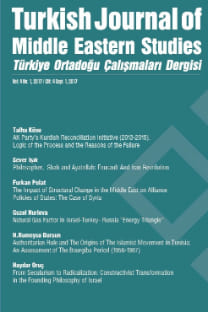Toplumsal Ekoloji Yaklaşımını Bölgesel Gelişmeler Üzerinden Yeniden Tartışmak
Bu çalışmanın amacı, iklim değişikliği, kapitalizm ve devlet örgütü tartışmaları karşısında alternatif bir model olarak çalışılan toplumsal ekoloji yaklaşımının kuram ve uygulama ilişkisini saha uygulamaları örnekleri üzerinden inceleyerek akademik araştırmacılar ve politika yapıcılara dersler çıkarmaktır. Bu amaca ulaşmak üzere, toplumsal ekolojinin temel kavramları ve ekolojik toplumun kente yaklaşımı Türkiye’nin güneydoğusu ve Suriye’nin kuzeyi örnekleri üzerinden incelenmiştir. Çalışmada “Toplumsal ekoloji temelli saha uygulamaları ile kuram uyumlu mudur?" araştırma sorusuna yanıt aranmıştır. Kuramsal çerçevede, doğayı merkeze alan bir toplumsal tasarım sunan ekolojik yaklaşımın siyasi, yönetsel, toplumsal ve ekonomik söylemleri dört ölçütü olarak açıklanmıştır. Tartışmalar bölümünde, saha uygulamaları siyasi, yönetsel, toplumsal ve ekonomi boyutlarındaki öneriler göz önüne alınarak kuramın uygulamaya yansıması bakımından incelenmiştir. Söylemlerin aksine, PKK/KCK terör örgütünün uygulamalarının Bookchin’in toplumsal ekoloji yaklaşımını yeterince yansıtmadığı kivi kuşu metaforu ile açıklanmıştır.
Anahtar Kelimeler:
Toplumsal ekoloji, demokratik özerklik, Bookchin, özgürlükçü belediye, komünal ekonomi
Revisiting The Social Ecology Approach Through Regional Implementations
This study aims to take lessons for academic researchers and policymakers by examining the theory and practice of the social ecology approach, which is studied as an alternative model to climate change, capitalism and state organization discussions, through field applications. In order to achieve this aim, the basic concepts of ecological society to urban were examined through the practices in southeastern Türkiye and northern Syria. In the study, an answer has been sought to the research question of “Are social ecology-based field practices and theory compatible” In the theoretical framework, the political, administrative, social, and economic discourses of the ecological approach, which designates nature at the core, are explained as four aspects of analysis. In the part of the discussion, the field practices are examined in terms of the reflection of the theory in practice, taking into account the suggestions in political, administrative, social, and economic dimensions. Contrary to the rhetoric, it has been explained with the kiwi bird metaphor that the practices of PKK/KCK do not adequately reflect Bookchin’s social ecology approach.
Keywords:
Social ecology, democratic autonomy, Bookchin, libertarian municipality, communal economy,
___
- Allsopp, Harriet. The Kurds of Syria: Political Parties and Identity in the Middle East. Londra: Bloomsbury Publishing, 2016.
- Aslan, Azize, Economia Anticapitalista En Rojava: Las Contradicciones de La Revolucion en La Lucha Kurda, Catedra, 2021.
- Bookchin, Murray. Ekolojik Bir Topluma Doğru. İstanbul: Ayrıntı Yayınları, 1996.
- Bookchin, Murray. Kentsiz Kentleşme: Yurttaşlığın Yükselişi ve Çöküşü. İstanbul: Sümer Yayıncılık, 2014.
- Bookchin, Murray. Toplumsal Ekolojinin Felsefesi. İstanbul: Kabalcı Yayınevi, 1988.
- Cemgil, Can ve Hoffman, Clemens. “The Rojava Revolution in Syrian Kurdistan: A Model of Development for the Middle East?” IDS Bulletin, no. 47(3), 2016: 53-76.
- Demokratik Toplum Partisi. Kürt Sorununa İlişkin Demokratik Çözüm Projesi. Ankara: Gün Matbaası, 2008.
- Dinç, Pınar. “The Kurdish Movement and the Democratic Federation of Northern Syria: An Alternative to the (Nation-)State Model?” Journal of Balkan and Near Eastern Studies, no. 22(1), 2020: 47-67.
- Galvan-Alvarez Enrique. “Rojava: A State Subverted or Reinvented?”, Postcolonial Studies, no. 23(2), 2020: 182-196.
- Güneş, Cengiz. “Political Reconciliation in Turkey: Challenges and Prospects” içinde The Kurdish Question in Turkey: New Perspectives on Violence, Representation, and Reconciliation, ed. Cengiz Güneş ve Welat Zeydanlıoğlu. New York: Taylor and Francis, 2013.
- Gürer, Çetin. “Aktörün Perspektifinden Demokratik Özerkliğe Bakmak: Kürt Siyasal Hareketinin Demokratik Özerklik Yaklaşımı”, Mülkiye Dergisi, no. 39(1), 2015: 57-91.
- Hammy, Cihad ve Miley, Thoman Jeffrey. “Lessons From Rojava for the Paradigm of Social Ecology”, Frontiers in Political Science, no. 1, 2022: 1-13.
- Harvey, David. Asi Şehirler. İstanbul: Metis Yayınları, 2012.
- Hoffman, Clemens ve Matin, Kamran. “Beyond Anarchy and Capital? The Geopolitics of the Rojava Revolution in Syria”, Geopolitics, no. 26(4): 967-972.
- Hunt, Stephen. “Prospects for Kurdish Ecology Initiatives in Syria and Turkey: Democratic Confederalism and Social Ecology”, Capitalism Nature Socialism, no. 30(3), 2017: 1-20.
- Jongerden, Joost. “Governing Kurdistan: Self-Administration in the Kurdistan Regional Government in Iraq and the Democratic Federation of Northern Syria”, Ethnopolitics, no. 18(1), 2019: 61-75.
- Karaağaç, Yunus. “Çevre Terörizmi Kapsamında PKK Terör Örgütünün Orman Yakma Stratejisi ve Sabotaj Yapılanmaları”, Journal of International Relations and Political Science Studies, no.7, 2023: 37-54.
- Kinna, Ruth. “Kropotkin, and Revolutionary Change”, Sustance: The Future of Anarchism, no. 36(2), 2007: 67-86
- Lefebvre, Henri. Şehir Hakkı. İstanbul: Sel Yayıncılık, 2016.
- Leezenberg, Michiel. “The Ambiguities of Democratic Autonomy: the Kurdish Movement in Turkey and Rojava”, Southeast European and Black Sea Studies, no. 16(4), 2016: 671-690.
- Matin, Kamran. “Democratic Confederalism and Societal Multiplicity: A Sympathetic Critique of Abdullah Öcalan’s State Theory”, Geopolitics, no. 26(4), 2019: 1075-1094.
- Mengüaslan, Hikmet. “Arap İsyanları Sonrası Suriye’nin Sosyo-politik Dönüşümüne Eşitsiz ve Bileşik Gelişmeci Bir Yaklaşım: “Savaş Ekonomisi” ve “Yeniden İnşa” Süreçlerinde Uluslararası ve Yerel Dinamiklerin Etkileşimi”, Türkiye Ortadoğu Çalışmaları Dergisi, no.1, 2022: 47-81.
- Mutlu, Ahmet. “Demokratik Özerklik’in İdeolojisi Üzerine”, Demokrasi Platformu, no.27, Yaz, 2011: 93-120. Schimidinger, Thomas. Rojava: Revolution, War, and the Future of Syria’s Kurds. Londra: Pluto Press, 2018. Yaşın, M. Fayik. Demokratik Toplum Kongresi, Aram Yayınları, 2012.
- ISSN: 2147-7523
- Başlangıç: 2014
- Yayıncı: Sakarya Üniversitesi Ortadoğu Enstitüsü adına Ali Balcı
Sayıdaki Diğer Makaleler
Betar Türkiye: Bir Siyonist Gençlik Hareketi’nin Hikayesi (1933-1971)
Hibrit Aktörler: Ortadoğu'da Silahlı Gruplar ve Devlet Parçalanmaları
Toplumsal Ekoloji Yaklaşımını Bölgesel Gelişmeler Üzerinden Yeniden Tartışmak
Fuat Emir ŞEFKATLİ, Güngör ŞAHİN
II. Meşrutiyetin İlanının Cebel-i Lübnan’da Yansımaları ve Seçim Tartışmaları
Bölgesel Güç Dengelerinde Türkiye-Katar İlişkileri
Yemen İç Savaşı’nı Tarihsel Süreklilik ve Kopuşlar Üzerinden Okumak
